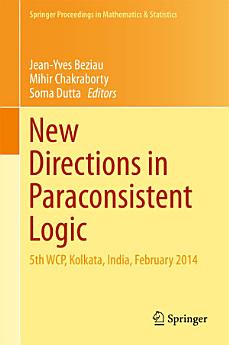New Directions in Paraconsistent Logic: 5th WCP, Kolkata, India, February 2014
About this ebook
About the author
JEAN-YVES BEZIAU, former PhD student of Newton da Costa, is professor at the University of Brazil, Rio de Janeiro, and editor-in-chief of Logica Universalis (Springer’s journal). He has done research around the world—France, Brazil, Poland, Switzerland and California—and has launched two series of international events: UNILOG, World Congress and School on Universal Logic; SQUARE, World Congress on the Square of Opposition. He is the logic part editor of the Internet Encyclopedia of Philosophy, joint project with Enyclopyedia of Logic that he is editing.
MIHIR KUMAR CHAKRABORTY, PhD, a formerly professor of pure mathematics and logic at the University of Calcutta, is visiting professor at the School of Cognitive Sciences, Jadavpur University, and director of Sivatosh Mookerjee Centre of Sciences, Kolkata. He also had research assignments in Poland, France, Canada, Australia, Italy, Germany and China. Professor Chakraborty had been visiting professor at the Centre for Soft Computing Research, Indian Statistical Institute, Kolkata; Institute for Logic Language and Cognition, Sun Yat-Sen University, Guangzhou, China; Institut de Recherche en Informatique de Toulouse, University Paul Sabataire, Toulouse, France; University of Paris VIII, France; University of Wollongong, Australia; University of Regina, Canada; National Institute of Advanced Studies, Bangalore, India; and Visva-Bharati, Santiniketan, India. A recipient of the Deutscher Akademischer Austuasch Dienst fellowship, IISc fellowship, and fellowship of West Bengal Academy of Sciences, Professor Chakraborty is member of the Council and Research Project Committee of Indian Council for Philosophical Research, and guest professor at the South West University of Chongqing, China. He has about 150 research papers to his credit in several international journals and edited volumes, co-authored one book A Geometry of Approximation (Springer), authored three books in vernacular Bengali on philosophy of mathematics, and co-edited several scientific publications. A member of the editorial board of several international journals and a book series Logic in Asia: Studia Logic Library (Springer), Professor Chakraborty’s areas of research are non-standard logics, rough set theory, fuzzy set theory, reasoning in uncertainty and vagueness, logic of diagrams, topology/functional analysis, and philosophy of mathematics. He also supervised 16 PhD students. Professor Chakraborty is founder of Calcutta Logic Circle, Association for Logic in India, Indian Society for Fuzzy Mathematics and Information Processing and member of the advisory board of International Rough Set Society and Indian Rough Set Society.
SOMA DUTTA did her master and doctoral research at the Department of Pure Mathematics, University of Calcutta, India. Her doctoral research is about a theory of graded consequence, a field of study closely related to fuzzy logic, initiated by her PhD supervisor Mihir Kumar Chakraborty. Her research interests also include paraconsistent logics and generalized quantifiers. She has been associated with The Institute of Mathematical Sciences, Chennai, India, as a postdoctoral fellow. Presently, she has a fellowship of European Research Consortium for Informatics and Mathematics (ERCIM) to pursue postdoctoral research at the Faculty of Mathematics, Informatics and Mechanics, University of Warsaw, Poland.








